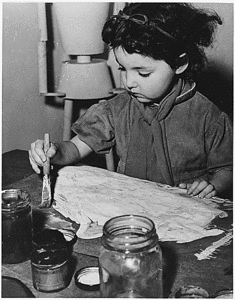Personality Development
Self-concept

Related to adolescent friendships and personality development is an aspect of personality known as self-concept. Some personality theorists and researchers contend that the developing and changing view a person holds of herself is an important aspect of individual differences and is often neglected under the temperament or trait conceptions of personality. From this perspective, a person's self-concept (which incorporates such features as the individual's history, sense of competency, and goals for the future) is an important behavioral determinant that is more dynamic, malleable, and encompassing than temperament or personality traits.
A critical component in the development of one's self-concept is referencing, including temporal referencing, a self-comparison from an earlier time to a later time, and social referencing, a comparison of one's self to others. Temporal and social referencing yield the type of self-examination that serves to increase the stability of individual differences through an individual making behavioral and/or environmental changes to maintain a self-concept. The particular style of referencing most commonly adopted changes across the lifespan. Temporal referencing is most common in childhood and in old age when relatively rapid physical and cognitive changes are most apparent. Conversely, social referencing is most common in adolescence and adulthood when individual change is less appreciable.
For adolescents, it is their emphasis on social referencing that makes having successful friendships especially important in the development of self-concept. Having successful friendships in adolescence leads to more interactive and positive comparisons between self and others. Without successful friendships, an adolescent is more isolated and is more likely to make negative comparisons. These negative comparisons during adolescence set a developmental trajectory toward low self-esteem and further social withdrawal in adulthood, making it difficult for such individuals to learn the social skills necessary to meet social support needs.
In regard to why some children and adolescents have more trouble making friends than others, evidence suggests that in some instances early individual differences in attachment and temperament predict later friendship problems or successes. For example, research has shown that children classified as insecure-avoidant are more likely than securely attached children to exhibit aggression, anger, and hostility in peer-group settings. Also, insecure-ambivalent children in such settings are more likely to exhibit social inhibition and a low threshold for frustration. These patterns of social behavior are predictive of peer rejection and lack of friendship. Similarly, research in infant and childhood temperament has revealed a predictive relation between friendship success and both overall emotionality and the ability of an infant or child to self-regulate emotional expression. Infants and children who are the most temperamentally emotional and the least capable of regulating their expression of emotion are on average less successful in developing and maintaining friendships.
In summary, research suggests that some early individual differences in attachment and temperament may lead to behavioral styles that ultimately undermine an individual's ability to successfully make and maintain friendships. The long-term effects of these individual differences could be harmful for the individual. With greater understanding and awareness of the elements and dynamics involved, however, interventions may be developed that help deflect the individual's development to more successful and healthy outcomes.
Additional topics
- Personality Development - A Biological Perspective On Personality Development
- Personality Development - Friendship
- Other Free Encyclopedias
Social Issues ReferenceChild Development Reference - Vol 6Personality Development - Perspectives On Personality Development, Attachment, Friendship, Self-concept, A Biological Perspective On Personality Development